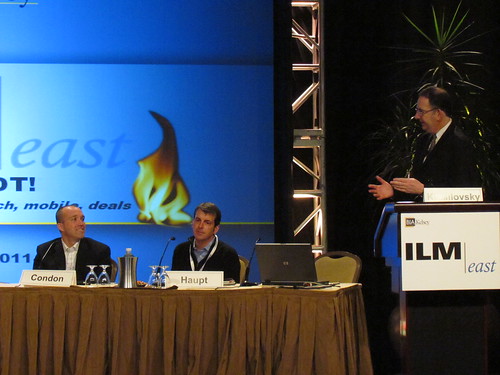ILM East: Is Hyperlocal Now Hyper-Relevant?

A powerful panel of local media players talked this morning about the challenges of doing hyperlocal effectively and profitably on “The New Wave of ‘Hyper-Relevant’ Media.” Hyperlocal has long been a vexing challenge, for publishers, from a content creation standpoint as well as making money.
One panelist compared it to mobile, an opportunity filled with anticipation and promise, but that always seemed to be a year away. Finally, mobile is living up to its promise. So when will hyperlocal follow suit?
Here are some panel highlights:
David Haupt, Director, Local Revenue, Examiner.com
Haupt describes Examiner.com as the biggest network of citizen journalists. The business started with a national focus, moving increasingly to local, both in terms of content and revenues. The site began with celebrity and nationally focused examiners and has moved down the line to “backyard poultry examiners.”
Today, Examiner has roughly 70,000 writers. It resists the term “content farm” since, as Haupt notes, “we don’t write for SEO; we allow our examiners to write about what they are passionate about.”
The challenge for Examiner is monetizing that passionate, local content. “Local sales, we are just getting into it,” Haupt said. He focused on seven local revenue avenues, built largely about intent.
Tim Condron, Director, New Digital Ventures, Washington Post New Ventures
Condron’s job is to indentify new digital businesses for the Post, which recently launched daily deals. Another initiative is Service Alley, which he describes as a “Free Angie’s List.” He believes there’s a place for free service with a brand like the Post behind it.
It has “been out since January. The model is it’s free to come on to claim listing, and we have prepopulated content on the listing. About 10 percent of the targeted businesses have claimed their profile.”
He said a vertical focus is key to doing hyperlocal well. “The more deeply we focus on a vertical, the better we can build tools for them.”
Mike DeLuca, Senior VP, AOL Local
AOL owns Patch, a network of hyperlocal sites that pays local freelancers to write about their communities. He also is responsible for all products aimed at local advertisers. AOL has other locally focused products like City’s Best, MapQuest and Wow Deal of the Day.
“When I got here, everything was relatively siloed,” he said. “I was tasked with bringing it all together into one local product.”
One of his key principals is selling solutions that are best for the SMB customer, not what happens to be in the sales rep’s bag.
“It comes down to qualifying customer, creating a solution that helps them maximize their ROI.”
The key to successfully advertising on a site like Patch is making sure it is really local. DeLuca used the example of Bank of America advertising its general services on Patch not interesting. However, something that is genuinely locally focused is really interesting.
“We want it to be seen as a local property, not a sellout to national advertisers.”
DeLuca said appealing to moms is a key to success in hyperlocal. “They are a big target,” he said. “Moms and very civic oriented, very social.”
Josh Resnick, VP & GM, Gannett Digital Media Network
Gannett has focused on hyperlocal in part via niche properties such as Moms Like Me and highschoolsports.com.
Resnick resisted being called a hyperlocal network. “We are a media group not a network,” he said. “There are a lot of interesting things we can do to integrate into site experience that a network couldn’t do.
“Moms are a key audience for Gannett as well. We reach moms through Moms Like Me, and also targeting moms though all of our properties.”
Resnick said hyper-relevance is ultimately more important than hyperlocal. Local is important, but it is not the only aspect that matters. Find what is relevant and present to them. No one has yet solved hyperlocal, he says, but like with mobile advertising, sooner or later next year will be this year.


intersting article, something to muse over, and think more and reseatrch more over, lcoal is so big!!
“We don’t write for SEO…” Really? As a former Examiner writer, I can report that Examiner has video tutorials on SEO for its writers, and constantly reminds writers (via emails and forum posts) to optimize their headlines and their content.